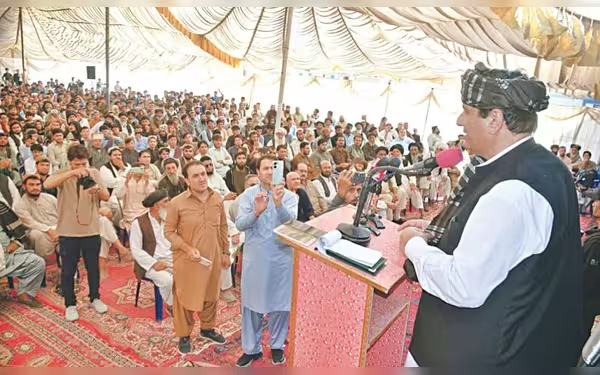Saturday, November 16, 2024 03:21 PM
Amir Muqam Urges UN and Kabul Support for Afghan Refugee Repatriation
- Minister Muqam calls for international support for Afghan refugees.
- Pakistan committed to dignified return of Afghan refugees.
- Healthcare and education improvements promised for Afghan refugees.
 Image Credits: dawn
Image Credits: dawnMinister Amir Muqam seeks UN and Kabul's support for the dignified return of Afghan refugees in Pakistan, addressing healthcare and education needs.
In recent years, Pakistan has been home to millions of Afghan refugees who fled their country due to ongoing conflict and instability. The situation has become increasingly complex, with many refugees facing challenges such as lack of proper documentation, healthcare, and education. As the world looks towards solutions for these displaced individuals, the Pakistani government is taking steps to facilitate their return to Afghanistan. Federal Minister Amir Muqam has recently called for support from the international community, the United Nations, and the Kabul government to assist in the repatriation of Afghan refugees living in Pakistan.
During a visit to an Afghan refugee camp in Saranan, Qila Abdullah, Minister Muqam emphasized that Pakistan is committed to providing “all possible help and assistance” to ensure the “honourable and respectful” return of Afghan refugees to their homeland. He stated, “I’m visiting the refugee camp myself to review the difficulties being faced by you people,” highlighting his dedication to understanding the challenges faced by these individuals. The minister pointed out that no other country in the world allows refugees to live without proper documentation as Pakistan does.
In light of recent terrorist attacks in Pakistan, Muqam urged the Afghan government to take responsibility and ensure that its territory is not used for attacks against Pakistan or any other nation. He expressed concern over Afghan immigrants in other countries who are allegedly engaging in “propaganda” against Pakistan, stating, “They have to realise that they should not create difficulties for Afghan refugees living in Pakistan.”
Prime Minister Shehbaz Sharif has consistently supported Afghan refugees, and Muqam reiterated the need to provide all necessary facilities for them. His visit aimed to assess the situation in the camp and reassure refugees that their issues would be addressed. Among the pressing concerns are health issues, including a lack of drinking water, which the minister promised to tackle with “all-out efforts.” He also acknowledged the shortage of doctors and medicines, pledging to improve healthcare services.
Furthermore, Muqam announced plans to expand the facility of Proof of Registration cards for refugees, ensuring that those whose cards had been blocked would have them restored after a review. Recognizing the importance of education, he stated that the government would soon appoint teachers to provide educational opportunities for the children of Afghan refugees.
In collaboration with the UNHCR and other institutions, the government is exploring projects to provide solar panels and batteries to families living in refugee camps. Additionally, efforts are being made to offer seats and scholarships to Afghan students in various universities and colleges across Pakistan.
During a high-level meeting, Muqam emphasized the need for maximum utilization of resources to achieve the objectives of the Commissionerate for Afghan Refugees. He stated, “Our tremendous efforts will continue to ensure the protection and welfare of Afghan refugees living in Pakistan peacefully.” The meeting also discussed the repatriation of illegal Afghan refugees and expressed satisfaction with the performance of relevant institutions.
As the situation unfolds, it is crucial for the international community to support Pakistan in its efforts to manage the Afghan refugee crisis. The cooperation between Pakistan and Afghanistan, along with the assistance of global organizations, will play a vital role in ensuring a safe and dignified return for Afghan refugees. By addressing the needs of these individuals and fostering a collaborative approach, there is hope for a brighter future for both the refugees and the nations involved.













